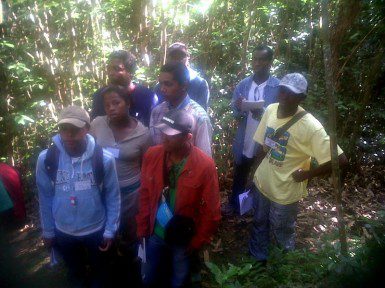Youth of today, although often under-represented in policy and decision making, are playing a critical role within global efforts to conserve biodiversity and mitigate the effects of climate change. Within Madagascar, a thriving network of young conservationists is already at large. Hosted by UNICEF Madagascar in Ranomafana, one of Madagascar’s best known protected rainforests, a delegation of 20 young conservationists aged 15-24 and representing 7 regions in Madagascar is meeting over the next two days to discuss the implications of climate change and to exchange personal experiences regarding their individual efforts to promote biodiversity conservation within their regions. Present amongst these participants are Joelison Tahindrazany (16) and Ody Rily (22), two young environmentalists from the remote coastal village of Andavadoaka, southwest Madagascar, selected for their personal contributions to conservation in Velondriake, the Indian Ocean’s largest community-managed marine protected area. Chosen to represent Velondriake, these youth leaders are sharing stories of their own personal conservation endeavours, including details on how they went about engaging and galvanising their peers to participate in conservation activities. All participants at the workshop have been encouraged to present their experiences using a variety of mediums such as song and dance, along with plenty of theatrical flare.
This ‘face-to-face networking and knowledge sharing’ event provides an invaluable platform for these young people to share their experiences and learn from one another. Including young members from a diverse array of backgrounds means that all participants will be confronted with the realities of different environmental situations and challenges, which is hoped will serve to increase overall awareness of the issues as well as improve collective understanding, information-sharing and acceptance between groups and individuals.
Objectives of the meeting include the foundation of a ‘youth Malagasy framework’ consolidating ideas on best practices in galvanising peers into action on key environmental issues, as well as compilation of a ‘youth-friendly’ information package for dissemination to youth groups throughout the country. It is also hoped that this workshop will encourage future action-planning for national-level advocacy and youth mobilization efforts around the climate change agenda.
With the aim of increasing the profile and potential of children and young adults to participate in conservation efforts throughout the country, this workshop marks an important step towards achieving a more inclusive framework for conservation. By incorporating the views held by young conservationists such as Joelison and Ody into policy development and decision-making, management objectives can start to cater for and address their needs, thereby ensuring that any activities initiated can be as effective and beneficial possible. It is also hoped that this workshop will further encourage this group of young people to continue their efforts and achieve even greater success in mobilising their peers around environmental issues, embracing their responsibilities as agents of social change to promote biodiversity conservation in their regions.


